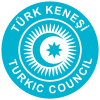Afshar people
 Tamgha of Afshar according to Mahmud al-Kashgari, which represents Bonelli's eagle according to Abu al-Ghazi Bahadur | |
| Regions with significant populations | |
|---|---|
| Iran, Turkey, Azerbaijan | |
| Languages | |
| Afshar, Azerbaijani,[1][2][3][4][5][6] Persian,[7] Turkish, Turkmen[8] | |
| Religion | |
| Islam | |
| Related ethnic groups | |
| Oghuz Turks |
The Afshar (Azerbaijani: Əfşar; Turkish: Avşar; Turkmen: Owşar; Persian: اَفشار Afshār) is one of the Oghuz Turkic tribes.[9] These originally nomadic Oghuz tribes moved from Central Asia and initially settled in what is now Iranian Azerbaijan, Azerbaijan Republic, Eastern Turkey. Later some of them were relocated by the Safavids to Khurasan, Kerman and Mazandaran.[10] Today, they are variously grouped as a branch of the Azerbaijanis[11][12] and Turkmens[13][14] or Turkomans.[15] Afshars in Iran remain a largely nomadic group,[16] with tribes in central Anatolia, northern Iran, and Azerbaijan.[17] They were the source of the Afsharid, Karamanid, Germiyanid dynasties,[18][19] Baku Khanate, Zanjan Khanate, Khalkhal Khanate, and Urmia Khanate.
According to Rashid-al-Din Hamadani, Afshar, the eponymous founder of the tribe, was a son of Yildiz Khan, the third son of Oghuz Khan. Afshar means "obedient".[20]
Nader Shah, who became the monarch of Iran in 1736, was from the Qereklu tribe (Persian: قرخلو) of Afshars.[21][22]
Afshar tribes[]
List of Afshar tribes are: Alplū, Arašlū, Bekešlū, Gündüzlü, Imirlü, Köse Aḥmedlū, Köselü, Pāpāglū, Qāsemlū, Qereḵlū, Karalu, Karamanlu, Salmanlu, Sindelli, Tur Ali Hacılu, Receplü, Balabanlu, Karabudaklı and Qirqlū.[23]
Afshars in Turkey[]
Afshars in Turkey mostly live in Sarız, Tomarza and Pınarbaşı districts of Kayseri province, as well as in several villages in Adana, Kahramanmaraş and Gaziantep provinces.[24] Most of Afshars in Turkey are descendants of those who migrated from Iran after the fall of Nader Shah.[citation needed] This is hinted in one of poems by Dadaloğlu, famous Afshar bard during the resistance against forced settlement policy in Ottoman Empire:[citation needed]
- "Kabaktepe asıl köyüm,
- Nadir Şah'tan gelir soyum."
- (Kabaktepe is my home village,
- Down from Nader Shah comes my lineage.)
- Avşar elleri
- "Kalktı göç eyledi, Avşar elleri,
- Ağır ağır giden eller, bizimdir.
- Arap atlar yakın eder, ırağı,
- Yüce dağdan aşan yollar, bizimdir."
- (Afshar folks stood up and moved,
- This slowly going folk is ours,
- Arab horses made the distances shorter,
- Roads passing the grand mountain are ours.)
- "Belimizde kılıcımız kirmâni,
- Taşı deler mızrağımın temreni,
- Hakkımızda devlet etmiş fermanı,
- Ferman padişahın, dağlar bizimdir."
While Afshars had remained nomadic and retained their Oghuz lifestyle, forced settlements caused them to adopt a settled lifestyle. A resistance against Ottomans under spiritual leadership of the bard Dadaloğlu and local Afshar lord Kozanoğlu was proven futile.[25][26]
Afshar among the Bozulus[]
In 1570-71, within the Bozulus, three branches of Diyarbakir Afshars under Mehmed Kethüdâ numbered around 804, 367 and 109. Apart from these, there were many more Afshar branches under the administration of other kethüdas.[27]
In the 17th century, some of Bozulus Afshars migrated to Central Anatolia and settled mostly in Karaman Eyalet. Other ones, especially members of Damascus Turkmens remained in their old settlements. This branch, which is called Boz Ulus Mândesi ('Bozulus remnant') on Ottoman documents, were later settled in Rakka Eyalet, however many of the tribesmen belonging to this community migrated to Western Anatolia.[27]
In 1716, the Köpeklü branch of Bozulus Afshars were seen in Mihaliç kaza. On the other hand, some other Afshars of Bozulus migrated to Iran during the reign of Shah Abbas.[27]
Genetics[]
In an Afshar village near Ankara where, according to oral tradition, the ancestors of the inhabitants came from Central Asia, the researchers found that 57% of the villagers had haplogroup L, 13% had haplogroup Q and 3% had haplogroup N-M231. Examples of haplogroup L, which is most common in South Asia, might be a result of Central Asian migration even though the presence of haplogroup L in Central Asia itself was most likely a result of migration from South Asia. Therefore, Central Asian haplogroups potentially occurred in 73% of males in the village. Furthermore, 10% of the Afshars had haplogroups E3a and E3b, while only 13% had haplogroup J2a, the most common in Turkey.[28]
Afshars in Turkmenistan[]
During the reign of Nader Shah, a group of Afshars assimilated with a couple of modern Turkmen tribes that currently live in the territory of present-day Turkmenistan, such as Gekleng, Murcheli, Esgi, and Ersary. It is known that they formed a backbone of the Murcheli tribe. The Afshars also played a major role in the formation of the Turkmen tribe of Alili.[29]
List of dynasties with Afshar origin[]
- Afsharid dynasty
- Ardabil Khanate
- Alaiye
- Aydınids
- Baku Khanate
- Beylik of Lâdik
- Germiyanids
- Karamanids
- Sarukhanids
- Zanjan Khanate
- Karabakh Khanate
Notable people from the Afshar tribe[]
- Nader Shah, founder of Afsharid Dynasty
- Yusuf Halaçoğlu, Turkish historian, politician
- Nure Sofi, founder of Karamanids
- Dadaloğlu, Turkish ashik
- Mirza Muhammad Khan I, founder of Baku Khanate
- Zulfaqar Khan Afshar, founder of Zanjan Khanate
- Junayd of Aydın, ruler of Smyrna
- Panah Ali Khan, founder of Karabakh Khanate
- Ai-Toghdï
See also[]
- Afshar language
- Javanshir clan
- Iranian Turks
- Afshar rugs
Notes[]
- ^ "Afghanistan Foreign Policy and Government Guide"; p. 172
- ^ "Ahmad Hasan Dani, Vadim Mikhaĭlovich Masson, Unesco, History of Civilizations of Central Asia: Development in contrast : from the sixteenth to the mid-nineteenth century; p. 724: Afshari (a variant of Azerbaijani still spoken by the Afshars in a village that is now part of northern suburb of Kabul)
- ^ Fascicle 3. — VIII. Azeri Turkish (author G. Doerfer), pp. 245–248.//Encyclopaedia Iranica. Volume III: Atas-Bayhaqi, Zahir-Al-Din. Edited by Ehsan Yarshater. New York: Bibliotheca Persica Press, 1989, 896 pages. ISBN 9780710091215 :Azeri dialects. We may distinguish the following Azeri dialects (see Širäliev, 1941 and 1947): (1) eastern group: Derbent (Darband), Kuba, Shemakha (Šamāḵī), Baku, Salyani (Salyānī), and Lenkoran (Lankarān), (2) western group: Kazakh (not to be confounded with the Kipchak-Turkic language of the same name), the dialect of the Ayrïm (Āyrom) tribe (which, however, resembles Turkish), and the dialect spoken in the region of the Borchala river; (3) northern group: Zakataly, Nukha, and Kutkashen; (4) southern group: Yerevan (Īravān), Nakhchivan (Naḵjavān), and Ordubad (Ordūbād); (5) central group: Ganja (Kirovabad) and Shusha; (6) North Iraqi dialects; (7) Northwest Iranian dialects: Tabrīz, Reżāʾīya (Urmia), etc., extended east to about Qazvīn; (8) Southeast Caspian dialect (Galūgāh). Optionally, we may adjoin as Azeri (or “Azeroid”) dialects: (9) East Anatolian, (10) Qašqāʾī, (11) Aynallū, (12) Sonqorī, (13) dialects south of Qom, (14) Kabul Afšārī.
- ^ A. Bodrogligeti, "On the Turkish vocabulary of the Isfahan Anonymous" Acta Orientalia Academiae Scientiarum Hungaricae; Vol. 21, No. 1 (1968), pp. 15-43; Akadémiai Kiadó
- ^ A. Bodrogligeti On the Turkish vocabulary of the Isfahan Anonymous//Acta Orientalia Academiae Scientiarum Hungaricae Vol. 21, No. 1 (1968), pp. 15-43.—Akadémiai Kiadó: To Qashqay and Aynallu Ligeti adds Afshar as another Azeri dialect possessing long vowels, as distinct elements of the sound system.
- ^ A.M.Abbasov Some notes on afshars of Afghanistan (in Russian), Soviet Turcology, 1975. № 4. p. 72.
- ^ Stöber 2010, "As they were embedded in a Fārsī-speaking environment, however, in many cases Fārsī became the mother tongue of the Afshārs".
- ^ Adnan Menderes Kaya, "Avşar Türkmenleri", Dadaloğlu Eğitim, Kültür, Sosyal Yardımlaşma ve Dayanışma Derneği, 2004; ISBN 9755691499
- ^ Oberling, P. "AFŠĀR". Encyclopedia Iranica. Retrieved 9 July 2009.
AFŠĀR, one of the twenty-four original Ḡuz Turkic tribes
- ^ Iran's Diverse Peoples: A Reference Sourcebook, ed. Massoume Price, (ABC-CLIO, 2005), pp. 75, 89.
- ^ Richard V. Weekes. Muslim peoples: a world ethnographic survey. AZERI. — Greenwood Press, 1978 — p. 56 — ISBN 9780837198804
- ^ "Азербайджанцы / Большая советская энциклопедия". gatchina3000.ru. Retrieved 2019-06-07.
- ^ From multilingual empire to contested modern state, Touraj Atabaki, Iran in the 21st Century: Politics, Economics & Conflict, ed. Homa Katouzian, Hossein Shahidi, (Routledge, 2008), 41.
- ^ James J. Reid, Crisis of the Ottoman Empire: Prelude to Collapse 1839-1878, (Franz Steiner Verlag, 2000), 209.
- ^ The Afghan Interlude and the Zand and Afshar Dynasties (1722-95), Kamran Scot Aghaie, The Oxford Handbook of Iranian History, ed. Touraj Daryaee, (Oxford University Press, 2012), 308.
- ^ Encyclopedia of The Modern Middle East and North Africa, (Detroit: Thomson Gale, 2004) P. 1112
- ^ "Archived copy". Archived from the original on 2017-09-12. Retrieved 2012-06-10.CS1 maint: archived copy as title (link)
- ^ Claude Cahen, Pre-Ottoman Turkey: a general survey of the material and spiritual culture and history c. 1071-1330, trans. J. Jones-Williams (New York: Taplinger, 1968), 281-2.
- ^ Leiser, Gary; Koprulu, Fuat (1992). Origins of the Ottoman Empire. p. 37. ISBN 9781438410432.
- ^ "Welcome to Encyclopaedia Iranica".
- ^ Tribal resurgence and the Decline of the bureaucracy in the eighteenth century, A.K.S. Lambton, Studies in Eighteenth Century Islamic History, ed. Thomas Naff; Roger Owen, (Southern Illinois University Press, 1977), 108-109.
- ^ The Struggle for Persia, 1709-1785, Cambridge Illustrated Atlas, Warfare: Renaissance to Revolution, 1492-1792, ed. Jeremy Black, (Cambridge University Press, 1996), 142.
- ^ Theodor Houtsma, "Ghuzenstämme", WZKM 2, 1888, p. 225.
- ^ Özdemir, Ahmet Z., Avşarlar ve Dadaloğlu, ISBN 9789756083406
- ^ Özdemir, Ahmet Z., Avşarlar ve Dadaloğlu, ISBN 9789756083406
- ^ [1]
- ^ Jump up to: a b c Faruk Sümer (1988–2016). "AVŞAR Türkiye Türkleri'nin ataları olan Oğuz elinin en tanınmış boylarından biri.". TDV Encyclopedia of Islam (in Turkish). Istanbul: Turkiye Diyanet Foundation, Centre for Islamic Studies.
- ^ Gokcumen O (2008). Ethnohistorical and genetic survey of four Central Anatolian settlements (Thesis). pp. 1–189. ISBN 9783845258546. OCLC 857236647.
- ^ Prokhorov, A.M, ed. (1978). "Azerbaijani language". Big Soviet Encyclopedia (in Russian) (3 ed.). Soviet Encyclopedia.
Sources[]
- AFŠĀR, P.Oberling, Encyclopædia Iranica, (9 July 2009);"AFŠĀR, one of the twenty-four original Ḡuz Turkic tribes".[2]
- Stöber, Georg (2010). "Afshār". In Fleet, Kate; Krämer, Gudrun; Matringe, Denis; Nawas, John; Rowson, Everett (eds.). Encyclopaedia of Islam, THREE. Brill Online. ISSN 1873-9830.
Further reading[]
- Bulookbashi, Ali A.; Negahban, Farzin (2008). "Afshār". In Madelung, Wilferd; Daftary, Farhad (eds.). Encyclopaedia Islamica Online. Brill Online. ISSN 1875-9831.
- Faruk Sümer (1988–2016). "AVŞAR Türkiye Türkleri'nin ataları olan Oğuz elinin en tanınmış boylarından biri.". TDV Encyclopedia of Islam (in Turkish). Istanbul: Turkiye Diyanet Foundation, Centre for Islamic Studies.
- Afshar tribe
